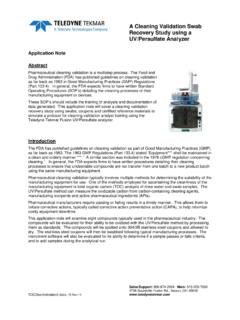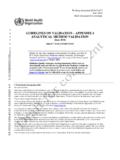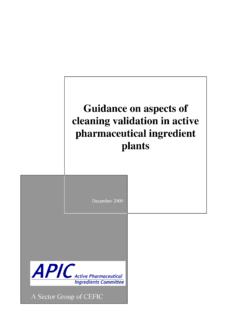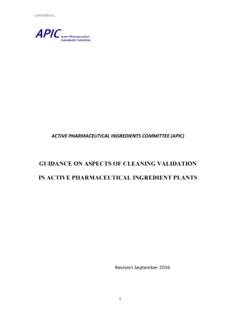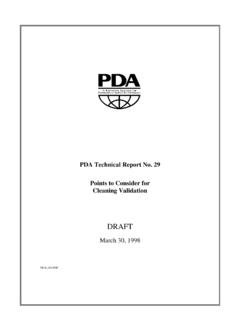Transcription of Preview - Validation of Analytical Methods for ...
1 MOURNE TRAINING SERVICES 14 Burren Road Warrenpoint Co. Down BT34 3SA Tel: + 44 (0) 28 41773724 Email: Web: EXCERPT FROM: Validation OF Analytical Methods FOR PHARMACEUTICAL ANALYSIS BY OONA MCPOLIN This excerpt is provided as a Preview to enable the reader to sample the content and style of this book. You can purchase the book at: Mourne Training Services also provide training courses on the topic of method Validation , transfer and verification. For more information, visit the website at: Cost: GBP Author: Oona McPolin ISBN: 978-0-9561528-1-7 Format: Paperback, 210 x 300mm (A4), 152 pages Publisher: Mourne Training Services A comprehensive guide to validating Analytical Methods for pharmaceutical analysis. Methods which are used for the analysis of pharmaceuticals generate critical data and it is essential that the quality of this data is assured. Validation is required to demonstrate that these Analytical Methods are fit for their intended purpose.
2 Validation data is also required by legislation, it is included in submissions to regulatory authorities all around the world for clinical trial and marketing applications. This book provides guidance on how to carry out a Validation study for Analytical Methods . Key features include: Full review of the available regulatory guidelines on Validation and in particular, those from the International Conference on Harmonisation (ICH). Sections of the guideline, Q2(R1), have been reproduced in this book with the kind permission of the ICH Secretariat. Thorough discussion of each of the Validation characteristics: Specificity; Linearity; Range; Accuracy; Precision; Detection Limit; Quantitation Limit; Robustness; System Suitability; plus practical tips on how they may be studied. What to include in a Validation protocol, with advice on the experimental procedure to follow and selection of appropriate acceptance criteria.
3 How to interpret and calculate the results of a Validation study, including the use of suitable statistical calculations. A fully explained case study demonstrating how to plan a Validation study, what to include in the protocol, experiments to perform, setting acceptance criteria, interpretation of the results and reporting the study. Oona McPolin (BSc MSc CSci CChem MRSC) is the training services manager of Mourne Training Services, a training consultancy which provides training solutions for pharmaceutical analysis. She is also a part-time college lecturer. This book is based on experience gained from working in the pharmaceutical industry for over 10 years and from the design and delivery of effective training courses relating to Analytical chemistry and the Validation of Analytical Methods . Validation of Analytical Methods for Pharmaceutical Analysis OONA McPOLIN Validation of Analytical Methods for Pharmaceutical Analysis OONA McPOLIN Copyright 2009 Mourne Training Services The right of Oona McPolin to be identified as the author of this work has been asserted by her in accordance with the Copyright, Designs and Patents act 1988.
4 All rights reserved. No part of this publication may be reproduced or transmitted in any form or by any means, electronic or mechanical, including photocopy, recording or any information storage and retrieval system, without permission. Mourne Training Services 14 Burren Road, Warrenpoint, Co. Down, Northern Ireland, BT34 3SA, United Kingdom Tel: +44 (0)28 30268236 Email: Web: ISBN 978-0-9561528-1-7 Preface This book provides guidance on how to perform Validation for the Analytical Methods which are used in pharmaceutical analysis. Validation of the Analytical Methods which are used during drug development and drug manufacturing is required to demonstrate that the Methods are fit for their intended purpose. Additionally, the pharmaceutical industry around the world is subject to extensive regulations due to the nature of its products. Validation is a regulatory requirement and the data generated during an Analytical method Validation study is included in submissions to regulatory authorities for clinical trial and marketing applications.
5 The definitive reference for this topic is the guideline produced by the International Conference on Harmonisation of Technical Requirements for Registration of Pharmaceuticals for Human Use (ICH), Q2(R1) Validation of Analytical Procedures: Text and Methodology . Sections of the guideline have been reproduced in this book with the kind permission of the ICH Secretariat. All ICH guidelines are available via the website, , and thus the Validation guideline may be easily checked for revisions. The guidance in this book is primarily aimed at Analytical Methods for small molecules. Reference is made to Validation of Methods for pharmaceuticals of biological origin, such as proteins and peptides. In principle the ICH guidelines should be applied to these types of compounds, however it is acknowledged they present particular challenges during Validation , in particular relating to biological assays.
6 The references provided in Chapter 1 provide more information on the Validation of Analytical Methods for biopharmaceuticals/ biotechnology derived products. At the back of the book there is a glossary to help the reader become familiar with the terminology used in Analytical method Validation . When a new term is introduced it is shown in bold to indicate to the reader that a definition is available in the glossary. In the appendix there is a list of abbreviations and also a question section so that the reader can test their understanding of the content. Oona McPolin Contents CHAPTER 1 INTRODUCTION .. 1 Validation in the Pharmaceutical Industry .. 1 Data Quality .. 1 Analytical Instrument Qualification (AIQ) ..2 The Purpose of an Analytical Method ..3 The life cycle of an Analytical method .. 4 Validation Guidelines ..5 Types of Analytical Methods ..6 Universal tests.
7 6 Analytical Methods not included in the ICH guidelines .. 8 Analytical techniques .. 9 Validation 10 10 Accuracy .. 10 Precision .. 10 Detection Limit .. 11 Quantitation Limit .. 11 Linearity .. 11 Range .. 11 Robustness .. 11 References .. 12 Further reading .. 14 CHAPTER 2 Validation CHARACTERISTICS .. 17 Validation during Method Development .. 17 Statistics in Analytical Method Validation .. 18 Mean .. 18 Standard deviation .. 18 Confidence intervals .. 19 Specificity .. 22 Specificity and selectivity .. 23 Identification Methods .. 23 Assay and impurity Methods .. 24 Bioanalytical Methods .. 26 Other Methods .. 26 Linearity .. 27 Verification of the calibration model .. 27 Regression analysis .. 29 Assay and impurity Methods .. 34 Bioanalytical Methods .. 34 Range .. 35 Accuracy .. 37 Assay .. 38 Impurities .. 40 Other Methods .. 41 Precision .. 42 Precision levels .. 43 System precision.
8 43 Measurement of precision .. 43 Repeatability .. 44 Intermediate precision .. 46 Reproducibility .. 47 Accuracy, trueness and precision .. 49 Detection Limit .. 50 Quantitation Limit .. 53 Robustness .. 55 Robustness during method development .. 59 Robustness during the Validation study .. 60 Solution stability evaluation .. 64 System Suitability .. 65 References .. 67 Further Reading .. 70 CHAPTER 3 THE Validation PROTOCOL .. 73 Contents of the Validation Protocol .. 73 Validation Characteristics to be Studied .. 74 Experimental Procedure and Acceptance Criteria .. 75 Specificity .. 75 Linearity .. 76 Range .. 77 Accuracy .. 77 Precision .. 78 Detection Limit and Quantitation Limit .. 79 Robustness .. 80 Stability .. 80 Validation Protocol by Type of Method .. 81 Identification .. 81 Assay .. 81 Impurities .. 83 Bioanalytical Methods .. 86 Other Methods .. 87 Validation of Methods in Pharmacopoeias.
9 87 Automated Methods .. 87 Validation by Phase of Development .. 88 Validation Software .. 90 Planning and Execution of the Validation Study .. 90 Review the timing and resources required .. 90 Determine the most efficient order of experiments .. 91 Execute the study .. 92 92 Case Study .. 93 Planning and execution of the study .. 99 References .. 102 Further reading .. 104 CHAPTER 4 THE Validation REPORT .. 107 Contents of the Validation Report .. 107 Statistics in Analytical Method Validation .. 108 Statistical significance .. 108 Comparative studies .. 108 Outliers .. 110 Results for Each Validation Characteristic ..112 112 Linearity .. 113 Range .. 113 Accuracy .. 113 Precision .. 113 Detection Limit and Quantitation Limit .. 114 Robustness .. 114 Stability .. 114 Results to include in the Validation report .. 115 Non-compliance with acceptance 117 117 Revalidation ..117 Case Study ..119 References.
10 125 Further reading .. 125 GLOSSARY .. 129 LIST OF ABBREVIATIONS .. 137 INDEX .. 141 2009 Mourne Training Services 1 Introduction alidation is defined as finding or testing the truth of something . When Analytical Methods are used to generate results about the characteristics of drug related samples it is vital that the results are trustworthy: they may be used as the basis for decisions relating to administering the drug to patients. A Validation study is performed on an Analytical method to ensure that reliable results are always obtained. Validation in the Pharmaceutical Industry Analytical method Validation is just one type of Validation required during drug development and manufacturing. To comply with the requirements of current Good Manufacturing Practices (GMP)1-3 pharmaceutical companies should have an overall Validation policy which documents how Validation will be performed.
